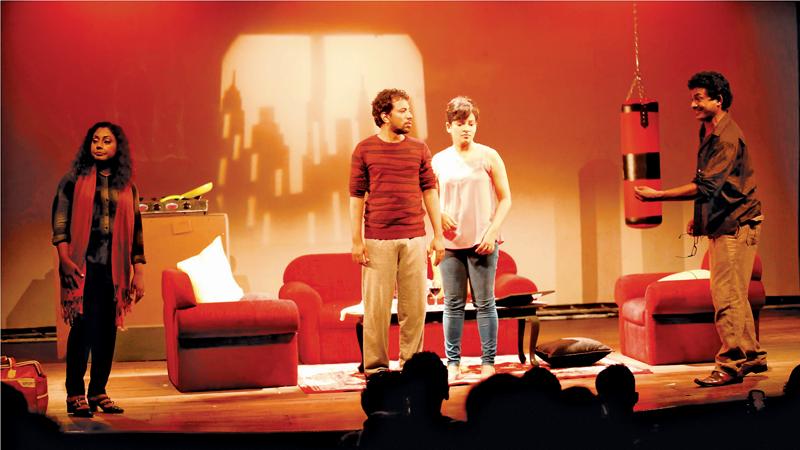
 On Saturday 19th August Pudgalikai Rahasigathai mounted the boards of the Punchi Theatre in Borella. It is a Sinhala adaptation of the British comedy play Private Lives by Noel Coward. The play was written as an adaptation for the Lankan stage by Saman Pushpa Liyanage, and brought to life as a directorial work by Ariyawansha Dhammage. The principal characters were played by a foursome of well seasoned actors who were Jagath Chamila, Umayangana Wickremasinghe, Wasanthi Ranwala, and Sarath Karunaratne.
On Saturday 19th August Pudgalikai Rahasigathai mounted the boards of the Punchi Theatre in Borella. It is a Sinhala adaptation of the British comedy play Private Lives by Noel Coward. The play was written as an adaptation for the Lankan stage by Saman Pushpa Liyanage, and brought to life as a directorial work by Ariyawansha Dhammage. The principal characters were played by a foursome of well seasoned actors who were Jagath Chamila, Umayangana Wickremasinghe, Wasanthi Ranwala, and Sarath Karunaratne.
Two divorcees remarry and coincidentally end up honeymooning in the same hotel in Sri Lanka’s honeymoon capital Nuwara Eliya. Old flames reignite as the impulsive divorcees reunite to runaway together abandoning their new spouses. This is the start of what unfolds as a comedy where crisscrossed love interests and mismatched coupling forms the crux of a tailspin journey for resolution and closure between lovers who are a bit muddled-up, to say the least.
The play unfolds in two settings. The first being the hotel in Nuwara Eliya where the couples planned their honeymoons, and the other being the apartment in Bambalapitiya where Henry (Jagath Chamila) and Amanda (Wasanthi Ranwala) live together after disserting their lawful spouses Victor (Sarath Karunarathne) and Maya (Umayangana Wickremasinghe). The stagecraft of this play was not of the optimally realist mode as in the styles of Ibsen or Chekov which seeks to recreate reality of our material settings in minute detail on the stage; but stage sets that effectively depict the fibre of realist theatre with tables, chairs, couches and apparatus that make up human habitations sans elaborate decor or ‘walling’ to create a visible room. This makes it more than the bare minimalist approach and is akin to what one finds in plays by veteran Sinhala theatre practitioner Rajitha Dissanayake, to cite an example.
Lighting was used effectively and was of special significance in bringing to life the ‘dream scene’ where a boxing match unfolds in the living room of the Bambalapitiya apartment where Victor dreams he knocks out Henry in a boxing match. Music was quite a significant element in this play. A medley of well loved Sinhala songs by the late M.S Fernando embellish the narrative, first as music heard from the performance of the band in the hotel and then as songs heard over record players and the radio. Further, some of these tracks also occupy the position of being thematically emphatic of the narrative on stage at certain junctures.
From among the four actors I believe Umayangana Wickremasinghe delivered the most effective characterisation. Her depiction of a naive young girl in her 20s who isn’t the brightest spark in the neighbourhood, with a babyish pulse, yet resolved in her pursuits, came out strikingly. Wickremasinghe was consistent in her mould and vein in delivering this character convincingly and must be especially commended. Although the play by virtue of being a comedy may be assumed suitable for family viewing, I do wonder given the manner in which the Sinhala slang term for ‘posterior’ is used somewhat freely in dialogues at times, whether Pudgalikai Rahasigathai would be a show fit for small children. I did notice a number of preteens present at Punchi Theatre for the show that evening and how they found the use of such a word brazenly, to be highly amusing. The casualness with which how indecorous language is used on the stage in my opinion, may affect the perceptions of children in their ‘impressionable age’ on proprieties of language.
 Given the theme and the nature of the characters, there is a certain dose of domestic discord that is rather pronouncedly presented in Pudgalikai Rahasigathai. Henry’s tempestuousness of character swirls violence at Amanda that qualifies as ‘domestic violence’, given the position they are a couple living together.
Given the theme and the nature of the characters, there is a certain dose of domestic discord that is rather pronouncedly presented in Pudgalikai Rahasigathai. Henry’s tempestuousness of character swirls violence at Amanda that qualifies as ‘domestic violence’, given the position they are a couple living together.
The intensity of the brutishness performed by Jagath Chamila as Henry’s erratic nature come to life, at times I felt, went clearly beyond the mark of ‘comedic comfortableness’, when he lashes out at Amanda. It was to the credit of the actor and the director very compelling.
Seeing situations of domestic violence as trivialised and ‘laughable’ occurrences may not create the most salubrious impression about adult relationships on small children when they experience theatre.
In my opinion if such moments of injurious behaviour by Henry were toned to be appear more ‘farcical’ in the physicality of his violence, it would seem more obviously contrived as ‘fiction of the stage’, rather than projecting the mould of a more realistic scenario to the eye of the child. I do state for the record that these are my personal opinions and observations and that I do not by any means try to play censor board panellist through my remarks.
Given the talented ensemble of actors and the laudable performance I saw at the Punchi Theatre, I believe Pudgalikai Rahasigathai will see much success in the days ahead as a comedy that will thrill audiences. Overall it is an enjoyable play that will surely be popular among theatregoers. Ariyawansha Dhammage and his team must be congratulated for what they have achieved.
